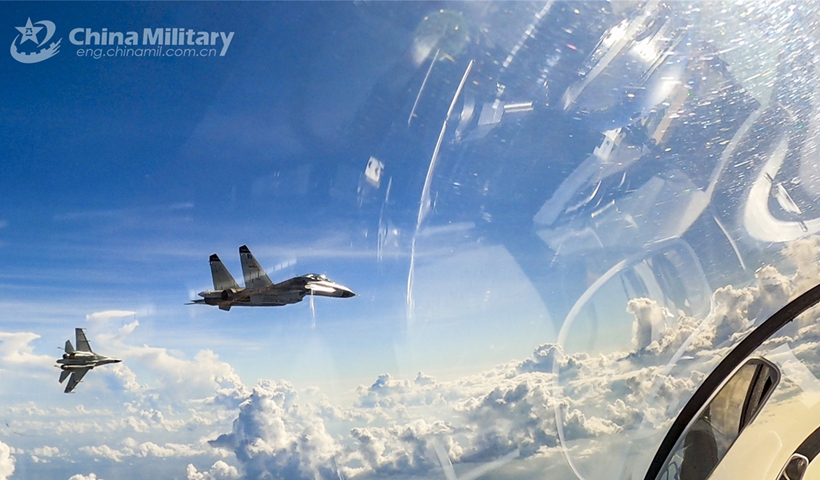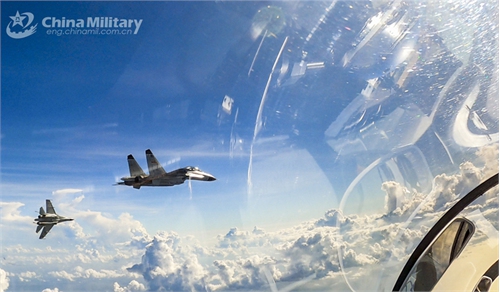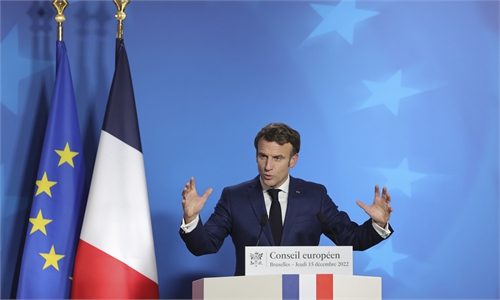The island of Taiwan unsure of how to respond to US’ scathing assessment of its armed forces

Fighter jets attached to a naval aviation brigade under the PLA Southern Theater Command fly in formation during a day-and-night flight training exercise in early March, 2023. (eng.chinamil.com.cn/Photo by Fu Jinquan)
Citing previously leaked documents, The Washington Post reported on Saturday that the military of the island of Taiwan is “unlikely to thwart Chinese mainland military air superiority in a cross-strait conflict,” highlighting a series of shortcomings in the Taiwan military’s equipment and training. In response, the defense authority on the island of Taiwan stated that it “respects outside opinions about its military preparedness,” but military experts said the “Taiwan military” is being slapped in the face by its master, yet still has to smile.
The documents leak, which first came to authorities’ attention last week, has provided extensive insight into US intelligence activities.
The classified documents addressing a potential conflict suggest Chinese mainland’s air force would have a much better shot at establishing early control of the skies, the Post said.
One assessment notes that the PLA’s modernization, its heightened operations tempo, and the use of civilian ferries in exercises near the island of Taiwan are “eroding” the US intelligence community’s ability to detect abnormal activity and preparations for “attacks.”
Previously, confidential Pentagon documents circulated on social media platforms revealed that the US government has not only been deeply involved in the Russian-Ukraine conflict but also continuously and intensively monitored its allies. The FBI arrested its primary suspect, 21-year-old member of the Massachusetts Air National Guard Jack Teixeira, on April 13.
The assessments also state that officials of the island doubt their air defenses system can “accurately detect missile launches,” that barely more than half of the island’s aircraft are fully mission capable, and that moving the jets to shelters would take at least a week — a huge problem if the Chinese mainland launched missiles before Taiwan had a chance to disperse those planes.
In addition, the documents also reveal the shortcomings of the island’s armed forces training, which says the island’s current doctrine of firing two air defense missiles per target “would be strained under high-volume PLA fires” from mainland’s short-range ballistic missile system, dispersed across multiple moving launch platforms. Airmen of the island of Taiwan train for shooting at single unmoving targets, the document said.
Moreover, Pentagon analysts note, Taiwan’s missile warning drills are highly scripted and inadequate for steeling civil authorities and the public for “a real-world event.”
Chinese military expert Zhang Xuefeng told the Global Times on Sunday that the contents of the US’ “classified” documents may not necessarily be "unknown secrets" but rather point to the intelligence sources or characterizations being classified.
"Overall, the document's analysis of the armed forces’ capabilities reveals some common sense, such as that slightly more than half of Taiwan's aircraft are fully capable of executing missions,” Zhang said. “It may sound incredible, but this is proportional to the capabilities of some US Air Force aircraft, which have similar readiness rates.”
In response, the defense authority on the island said in a statement that it “respects outside opinions about its military preparedness,” asserting that Taiwan’s defense system is carefully constructed based on threats and that Taiwan authorities are “absolutely capable, determined and confident”in ensuring security.
Regarding the statement, Zhang said that the Taiwan military is indeed being slapped in the face by its master, yet still has to smile and that if the document had not come from the US, it would be difficult for Taiwan's military to express “respect.”
“Furthermore, the so-called carefully constructed defense system of Taiwan's military will quickly crumble in the face of the PLA's superior offensive system. Taiwan's supposed absolute capability, determination, and confidence are probably only reflected in words,” Zhang said.
An anonymous military expert believes that, in fact, the PLA's military exercises around Taiwan and the normalization of deterrence have already made the “Taiwan independence” secessionists feel the pressure of challenging the Chinese mainland’s red lines.
At present, the PLA's military deterrence around Taiwan has become the norm, and as the collaboration between the US and the island of Taiwan grows more frequent, so do the PLA’s military exercises and the rapid enhancement of its combat capabilities, the expert said.


